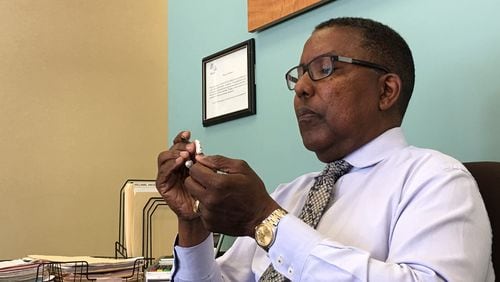What’s worse than that constant drone of leaf blowers? Not hearing them. An estimated 48 million Americans — one in five — report some degree of hearing loss. To understand life in a muted world, the Miracle-Ear Foundation wants people to join its annual “One Day Without Sound” campaign, taking place this year on Wednesday, May 31. Participants are asked to wear earbuds or earplugs throughout the day. “The purpose is to help create a more empathetic view of what hearing loss is and what it’s like to live with it,” says Vic Warmsby, a hearing aid specialist and Miracle-Ear franchisee in metro Atlanta. The campaign also wants to educate people about what they can do to prevent hearing loss. (Hint — plug up before grabbing the blasted leaf blower.)
Q: First, talk about what hearing is.
A: The whole auditory channel involves not only the ear's ability to interpret and process sound but also the brain's ability to put understanding to it. You need both parts of the equation to hear.
Q: Why is “One Day Without Sound” important?
A: We ask people to live one day in the shoes of someone who is hearing impaired by wearing a pair of earphones or earplugs that you can get from the local drugstore. If you don't have hearing loss, you don't understand the day-to-day nuances that someone who is hearing impaired goes through. They obviously have frustration communicating but they may also experience other problems like depression. They may withdraw from social settings because they just aren't comfortable being there. Family members may think that they aren't paying attention or just don't want to listen or could do better if they just tried harder when really, they are doing the best they can.
Q: What else does the Miracle-Ear Foundation do?
A: It helps adults and children get hearing aids if they don't have other avenues. For adults, there is a $150 application fee and if they are approved, and we have a very high approval rate, Miracle-Ear will furnish two hearing aids at no charge. Children under 18 don't pay the application fee.
Q: Why is hearing loss so prevalent?
A: We have a very noisy society and noise exposure is one of the main causes of hearing loss, which is a problem that is getting worse, not better. I get asked all the time if the younger generation could be damaging their hearing with headphones and MP3 players and other digital devices. The answer is, absolutely.
Q: Hearing loss can result from cumulative exposure to loud noise?
A: Yes. Say you go to several rock concerts in your late teens and early 20s. The sound can come out of speakers at about 120 decibels. And say you experience some damage to your hearing. Then over the next 40 years, you are exposed to more noise from things like leaf blowers or MP3 players. Certain medications and heredity can contribute to hearing loss.
Q: Is hearing loss reversible?
A: The most prevalent type of hearing loss is caused by nerve damage and is irreversible. Ringing in the ears, or tinnitus, is often a very early warning sign that you have damaged the structure of the nerves. In the mountains of North Georgia and Appalachia, they used to call that "deaf bells." For these people, the only solution is hearing aids. There are other types of hearing loss that can be medically treated. The best thing is to prevent hearing loss.
Q: How do you do that?
A: The biggest thing is to wear earplugs or hearing protection when you are in a noisy environment. Limit exposure to loud noises. If you can't hear the person in front of you, it is too loud. Kids need to limit the time with their earbuds in listening to music or streaming. Instead of listening for four hours, try two. Instead of having the volume full on, take it to half. It should never be more than half. We all like rock and roll and it sounds better when it is loud. But there is a price to that. You'd be surprised how many of rockers can't even hear the music they are playing.
Information: www.onedaywithoutsound.org.






